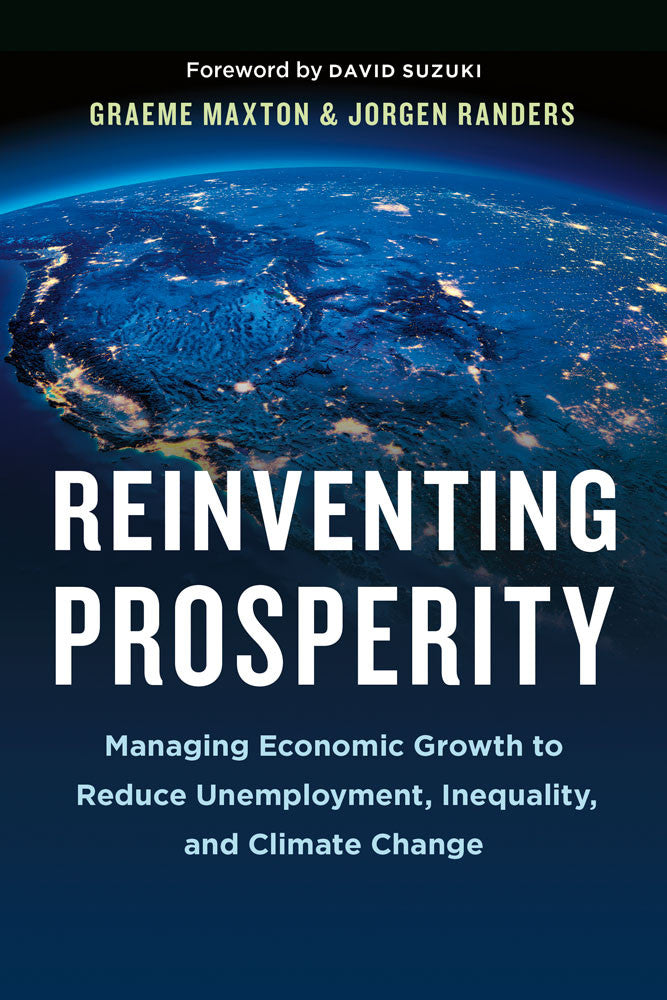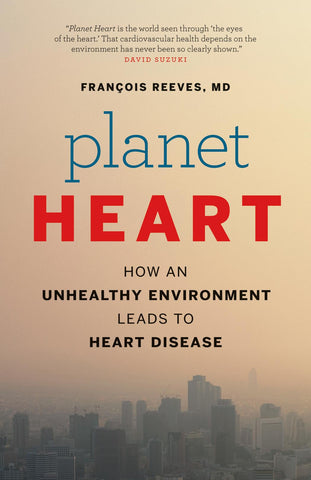Reinventing Prosperity
Managing Economic Growth to Reduce Unemployment, Inequality and Climate Change
- ISBN: 9781771642514
- Tags: Current Affairs & Politics, David Suzuki, Graeme Maxton, Jorgen Randers, Nature & Environment,
- Dimensions: 6 x 9
- Published On: 9/16/2016
- 240 Pages
- ISBN: 9781771642521
- Tags: Current Affairs & Politics, David Suzuki, Graeme Maxton, Jorgen Randers, Nature & Environment,
- Published On: 9/16/2016
- 240 Pages
A persuasive economic argument that proves we can all live better lives in this finite world.
In Reinventing Prosperity, Graeme Maxton and Jorgen Randers offer a new approach with thirteen recommendations that should be possible to implement around the world. This book addresses the forty-year-old growth/no-growth debate by explaining how it is possible to reduce unemployment, poverty, inequality, and the pace of climate change and still have economic growth—if we want. Published in Partnership with the David Suzuki Institute.
Graeme Maxton is the Secretary General of the Club of Rome and a former regional director of the Economist Intelligence Unit in Asia. He is the author of The End of Progress–How Modern Economics Has Failed Us, which was nominated for the Financial Times and Goldman Sachs Business Book of the Year Award.
Jorgen Randers is a professor of climate strategy at the Norwegian Business School, where he was president from 1981 until 1989. He is also a former Deputy Director General of WWF International and a co-author of the bestselling Limits to Growth.
“A fascinating, data-rich look at some of the most fundamental
questions our species has ever faced—and a striking argument for
maturity over endless growth.”
—Bill McKibben, author of Deep Economy
“The problems society faces to achieve a sustainable and desirable
future are well known, but solutions seem impossible. Maxton and
Randers describe thirteen politically feasible proposals that can
actually solve these problems. A must-read for anyone who wants
to create a better world.”
—Prof. Robert Costanza, VC’s chair in public policy, Crawford
School of Public Policy, Australian National University
“This book has the power to induce policy changes that are imperative
for the creation of an equitable, peaceful, and sustainable
future for human society.”
—Rajendra K. Pachauri, past-chair, Intergovernmental Panel on Climate Change (IPCC); executive vice chairman, The Energy and Resources Institute (TERI)
“Maxton and Randers make thirteen feasible proposals that, if
implemented, would transform the future of humanity. This book
is not just a ‘must read’; its solutions are a ‘must do’!”
—Stewart Wallis, executive director, New Economics Foundation 2003–15
From the Preface
There are many things to be concerned about in the world, from persistently high levels of unemployment and widening inequality to continued resource depletion, rising pollution, increasing biodiversity losses, and widespread poverty.
The biggest problem, however, is the gradual change humanity is causing to the climate. If nothing is done to stop global warming, progress in almost all areas of human endeavor will gradually slow over the next fifty years because of more frequent, and more scary, climatic events—and worse will follow.
Unfortunately, almost nothing is currently being done to address this problem.
People do not respond because they do not dare to challenge the existing economic system, because they believe that the steps needed to cut greenhouse gas emissions will reduce economic growth. They think that lower economic growth will increase joblessness in the rich world and condemn much of the poor world to decades of poverty, which in turn will increase inequality—a big enough problem already. So, rather than making the transition to a cleaner, more sustainable world, people focus on boosting economic growth because they believe this will increase the number of jobs and improve living standards, even though inequalities have been widening and the climate problem is worsening. Once there are more jobs and people are better off, they seem to be saying, society can take the steps needed to fix the climate problem.
If we could show that it is possible to overcome this hurdle, we reasoned, if we could break the perceived link between economic growth, jobs, and equality, we might change this. If we could show that it is possible to create jobs, boost average living standards, and reduce inequality—even without any economic growth at all—we could overcome the major barrier that stops people from acting.
That is what this book is about. It is about how to cut unemployment and narrow the gap between rich and poor in the developed world while slowing the pace of climate change. It is about how to make sure that everyone has enough paid work, or enough income, to live comfortably. It is about how to make the transition to a cleaner, greener world without making people worse off in the process.
Many of our recommendations are unconventional, and some will certainly be controversial. Because they frequently run against the current political and economic tide, the knee-jerk reaction may be to reject them. They often require a little time for reflection before people can see that they really do describe a better path forward, a viable way to increase average living standards everywhere.





